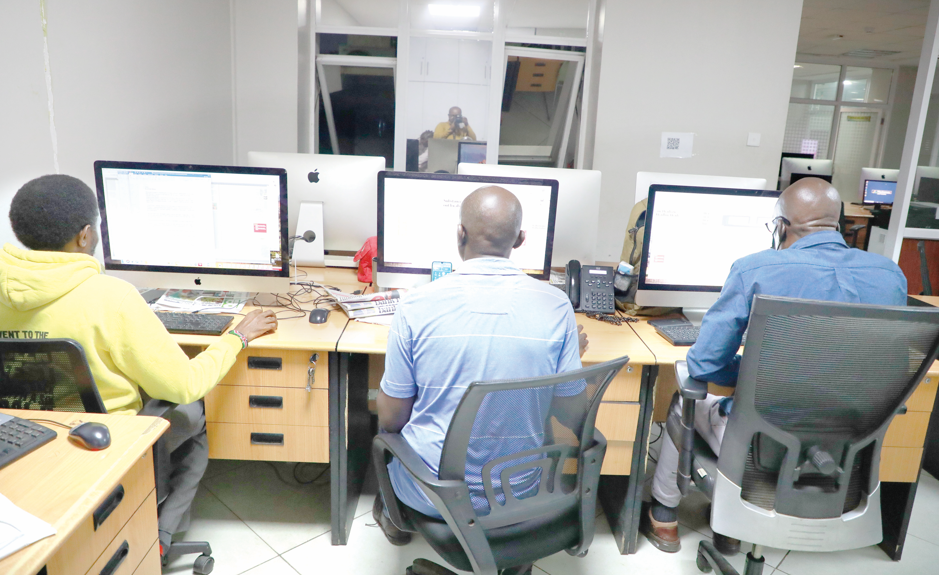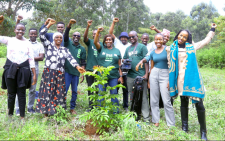People Daily makes history as Kenya’s first fully digital newspaper

Thirty-two years ago, People Daily launched as a weekly print publication and has since evolved into Kenya’s most trusted and boldest daily newspaper. Today, it sets a groundbreaking precedent by transitioning fully to digital — a first for a major newspaper not only in Kenya but across Africa.
As a digital journalism enthusiast, I see this transition as more than just bold — it’s an exciting yet challenging leap for traditional journalists who may worry about their roles or question the value of their craft in a digital era. However, this shift has the potential to unlock new opportunities and redefine the landscape of journalism.
People Daily Managing Editor Emeka-Mayaka Gekara, exuding confidence, is firmly convinced that the future is undeniably digital.
“The future is here, and today People Daily has taken a bold step that signifies a rebirth of this 32-year-old publication.
“Journalism insiders have known for a long time that the generation of newspaper readers who loved the smell of ink in a freshly published newspaper that they held in their hands are fading out and we must serve younger generations on the platforms where they hang out,” he told me.
“As we turn a new leaf on digital media platforms, we will continue to serve our customers with content on how politics affects their lives, current affairs, personal finance, health, lifestyle, sports, culture, science, technology and innovation, education, the environment, mental health and awareness.”
Conserving environment
Mediamax Network Ltd CEO Ken Ngaruiya not only supports the direction People Daily is taking but is also committed to leveraging the shift to digital as an opportunity to conserve the environment by growing trees rather than cutting them down.
“People Daily going green means using digital printing to publish an e-paper and reducing 100 percent the environmental impact of newspaper production and associated supply chain processes while still upholding the proper ethics of journalism,” Ngaruiya said.
“People Daily is deliberately making a green choice by taking into consideration the environment and society in which its consumers operate in.
“We have chosen 2 key aspects of organizational and societal sustainability in our journey that is environmental sustainability and social sustainability.
“Environmental sustainability involves protecting the planet for future generations by preserving natural resources like trees instead of cutting them.
“To this effect, we have partnered with the Green Belt Movement (GBM) in four main areas of activities: growing trees and water harvesting; climate change; mainstream advocacy; and gender, livelihoods and advocacy. GBM works with local communities to improve their environment and livelihoods in line with the People Daily vision.”
The shift from print to digital has reshaped global journalism over the last few decades, with numerous publications around the world pivoting to digital-only formats.
This trend, prompted by changing reader habits and the accessibility of digital media, signifies a new era for news consumption and production.
In a bold move, People Daily has now embraced this transformation fully, becoming the country’s first major newspaper to transition entirely to digital publication.
Newspapers worldwide have increasingly moved to online-only formats.
In 2009, the Seattle Post-Intelligencer in the United States became one of the first major daily newspapers to make this leap after publishing in print for nearly 149 years.
Growing list
In the UK, The Independent also embraced a digital-only model in 2016 to adapt to the digital landscape and the decline in print revenue.
Similarly, Scotland’s Caledonian Mercury went digital in 2010, joining a growing list of publications seeking sustainable models through online distribution.
Globally, newspapers that have transitioned entirely to online have been able to reach audiences more effectively by harnessing multimedia capabilities, interactive elements, and real-time updates. This transition allows publications to leverage data analytics to understand reader preferences and tailor content, which has become invaluable for both audience engagement and monetisation.
While digital newspapers are increasingly common globally, Africa has been slower to adopt purely digital models.
People Daily marks a significant milestone as the first major newspaper on the continent to fully embrace digital-only publishing. This move aligns People Daily with a global trend led by publications like The Independent, which saw online growth after its digital pivot.
For Kenya, this transition establishes People Daily as a leader in digital innovation in African media, presenting a model that other publications on the continent might soon follow.
Wider audiences
Some African publications that transitioned to digital-only or significantly embraced digital formats include South Africa’s Mail & Guardian, The Continent, and Daily Maverick.
Another example is The Namibian, which transitioned to digital-first practices while still retaining some print production. Additionally, publications like Nigeria’s Premium Times and Sahara Reporters have built reputations for digital journalism, often prioritising online distribution to reach wider audiences.
Closer to home, earlier this year, Tanzania’s The Citizen transitioned to a digital-first, online subscription model for its weekend editions. Applauding the move, Dr Saumu Jumanne, a lecturer at Dar es Salaam University College of Education, remarked, “Whether we like it or not, the future is digital.”
These shifts reflect a growing demand for digital news in Africa, where demographic divides in digital access persist, but online media consumption continues to grow, especially in urban areas and among younger, more educated audiences.
Consumption habits
Churchill Otieno, a veteran Kenyan journalist, current president of the Africa Editors Forum and executive director of the East Africa Editors Society, among other roles, acknowledges the transformation in news consumption trends.
“Africa’s population is increasingly youthful, and this demographic is quick to embrace technological advancements that have disrupted how people consume news,” he said.
“As a result, targeting younger audiences necessitates a shift in how news is delivered, adapting to their preferences and consumption habits.
“In this era, it’s no surprise that a newspaper is transitioning to digital-only formats. However, a word of caution: simply transplanting print content to a digital format may not suffice, as the audience dynamics often differ significantly.”
This shift aligns with global trends, where major newspapers worldwide have adopted digital models to address changing consumer preferences and the economic challenges associated with print.
By joining these ranks, People Daily not only enhances its reach but also embraces the digital media future of news in Africa, helping to bridge gaps in access and adapt to an increasingly tech-savvy audience.
Advantages of going digital
People Daily’s decision to go digital-only offers numerous benefits:
- Cost efficiency: Digital-only formats eliminate the substantial costs associated with printing and distribution, especially in a period where print advertising revenues are declining globally.
- Environmental impact: Eliminating the print process reduces paper use, contributing positively to environmental conservation efforts — a message that resonates with environmentally conscious readers.
- Broader accessibility: A digital format enables instant global reach, making it easier for Kenyans at home and abroad to access news. With rising mobile phone and internet penetration in Kenya, People Daily is well-positioned to reach tech-savvy audiences seeking accessible, up-to-date news.
- Real-time updates and interactivity: Digital platforms allow for more dynamic content, including videos, interactive infographics, and live updates. Readers can engage more deeply with articles, commentaries, and breaking news, increasing engagement and creating a sense of community.
- Data-driven journalism: With online readership comes access to analytics, allowing People Daily to track reader preferences and tailor content accordingly. This data-driven approach can inform editorial choices, leading to a more engaging and responsive news platform.
The Future of Digital Journalism in Kenya
People Daily’s decision to fully transition to digital marks a new chapter in Kenyan journalism. It sets a precedent, showing that African publications can thrive without print editions by utilising technology to deliver quality journalism.
This shift positions People Daily as a leader in Kenya’s evolving media landscape, paving the way for other newspapers to consider digital-only models that embrace both sustainability and reader needs.
— The writer is the Digital Editorial Content Lead at Mediamax Network Ltd
Author
Chrisphine Magak
Chrisphine Magak is the Digital Editorial Content Lead at Mediamax Network Ltd.
View all posts by Chrisphine Magak













